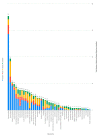Are We Neglecting Nutrition in UK Medical Training? A Quantitative Analysis of Nutrition-Related Education in Postgraduate Medical Training Curriculums
- PMID: 33809505
- PMCID: PMC8000414
- DOI: 10.3390/nu13030957
Are We Neglecting Nutrition in UK Medical Training? A Quantitative Analysis of Nutrition-Related Education in Postgraduate Medical Training Curriculums
Abstract
Suboptimal nutrition is a major cause of morbidity and mortality in the United Kingdom (UK). Although patients cite physicians as trusted information sources on diet and weight loss, studies suggest that the management of nutrition-related disorders is hindered by insufficient medical education and training. Objectives of this study were to: (1) Quantify nutrition-related learning objectives (NLOs) in UK postgraduate medical training curriculums and assess variation across specialties; (2) assess inclusion of nutrition-related modules; (3) assess the extent to which NLOs are knowledge-, skill-, or behaviour-based, and in which Good Medical Practice (GMP) Domain(s) they fall. 43 current postgraduate curriculums, approved by the General Medical Council (GMC) and representing a spectrum of patient-facing training pathways in the UK, were included. NLOs were identified using four keywords: 'nutrition', 'diet', 'obesity', and 'lifestyle'. Where a keyword was used in a titled section followed by a number of objectives, this was designated as a 'module'. Where possible, NLOs were coded with the information to address objective 3. A median of 15 NLOs (mean 24) were identified per curriculum. Eleven specialties (25.6%) had five or less NLOs identified, including General Practice. Surgical curriculums had a higher number of NLOs compared with medical (median 30 and 8.5, respectively), as well as a higher inclusion rate of nutrition-related modules (100% of curriculums versus 34.4%, respectively). 52.9% of NLOs were knowledge-based, 34.9% skill-based, and 12.2% behaviour-based. The most common GMP Domain assigned to NLOs was Domain 1: Knowledge, Skills and Performance (53.0%), followed by Domain 2: Safety and Quality (20.6%), 3: Communication, Partnership and Teamwork (18.7%), and 4: Maintaining Trust (7.7%). This study demonstrates considerable variability in the number of nutrition-related learning objectives in UK postgraduate medical training. As insufficient nutrition education and training may underlie inadequate doctor-patient discussions, the results of this analysis suggest a need for further evaluation of nutrition-related competencies in postgraduate training.
Keywords: communication; curriculum; diet; medical education; nutrition; obesity; postgraduate; training.
Conflict of interest statement
The authors declare no conflict of interest.
Figures






References
-
- England N.H.S. Guidance-Commissioning Excellent Nutrition and Hydration 2015–2018. England, N.H.S.; London, UK: 2015. A Report by NHS England.
-
- Treating and Preventing Ill Health. NHS Long Term Plan. [(accessed on 18 September 2020)];2020 Available online: https://www.longtermplan.nhs.uk/areas-of-work/prevention/treating-and-pr...
-
- Obesity. NHS Long Term Plan. [(accessed on 18 September 2020)];2020 Available online: https://www.longtermplan.nhs.uk/online-version/chapter-2-more-nhs-action...
-
- Russell C.A., Elia M. Nutrition Screening Surveys in Hospitals in the UK, 2007–2011. British Association for Parenteral and Enteral Nutrition; Redditch, UK: 2014.
MeSH terms
LinkOut - more resources
Full Text Sources
Other Literature Sources
Research Materials

